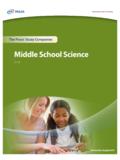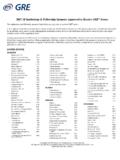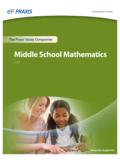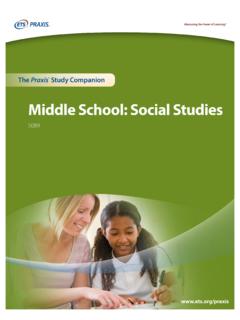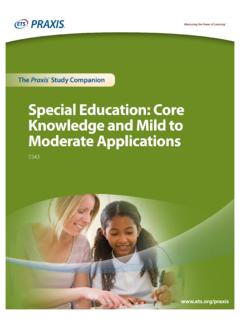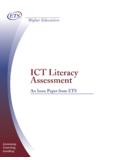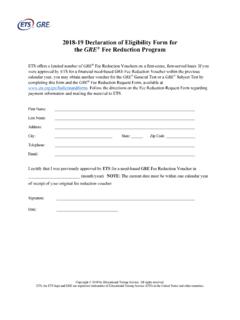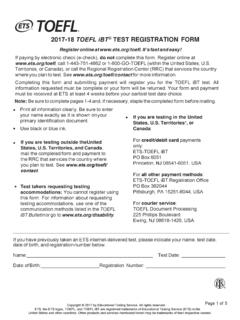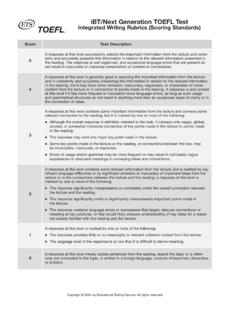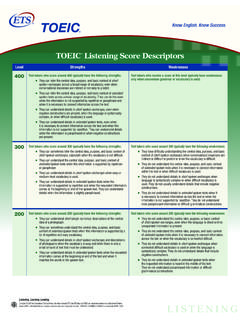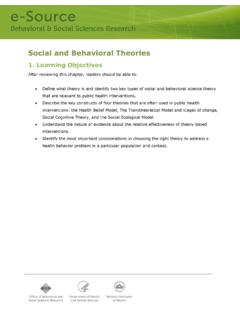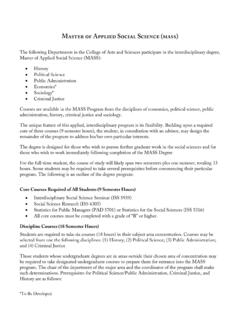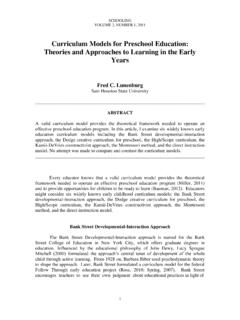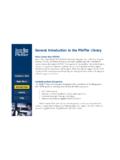Transcription of Major Field Test Psychology program flyer - ETS Home
1 Find out how to prove and improve the effectiveness of your Psychology program with the ETS Major Field tests . Content ValidityThe Major Field Test (MFT) in Psychology , first administered in 1989, assesses mastery of concepts, principles and knowledge by graduating Psychology students. To ensure fairness and content relevance, the test is revised approximately every four to five by Leading Educators in the FieldExperienced faculty members representing all the relevant areas of the discipline determine test specifications, questions and types of scores reported. ETS assessment experts subject each question to rigorous tests of sensitivity and reliability. Every effort is made to include questions that assess the most common and important topics and addition to factual knowledge, the test evaluates students abilities to analyze and solve problems, understand relationships and interpret material.
2 Questions that require interpretation of graphs, diagrams and charts are included. Academic departments may add up to two subgroups and as many as 50 additional locally written questions to test areas of the discipline that may be unique to the department or Comparative DataA Comparative Data Guide, published each year, contains tables of scaled scores and percentiles for individual student scores, departmental mean scores and any subscores or group assessment indicators that the test may support. The tables of data are drawn from senior-level test takers at a large number of diverse institutions. Nearly 1,500 colleges and universities employ one or more of the Major Field tests for student achievement and curriculum evaluation each Develops the MFT in Psychology ?Individuals who serve or recently have served on the Committee for the MFT in Psychology are faculty members from the following institutions:Albion CollegeBall State UniversityCalifornia State University Monterey BayEast Tennessee State UniversityGeorgia College & State UniversityIthaca CollegeMissouri State UniversitySpelman CollegeFor more information about the MFT in Psychology :Phone: 1-800-745-0269 Email: Testing Service Rosedale Road Princeton, NJ 08541 Test Content PsychologyCopyright 2019 by Educational Testing Service.
3 All rights reserved. ETS, the ETS logo and MEASURING THE POWER OF LEARNING. are registered trademarks of Educational Testing Service (ETS). 28813 (K-4 PMF)The Major Field Test in Psychology consists of 140 multiple-choice questions, some of which are grouped in sets and based on such materials as a description of an experiment or graphs of psychological functions. The questions in the Psychology test are drawn from the courses of study most commonly offered in undergraduate programs within the broadly defined Field of Psychology . Questions often require students to identify theories, psychologists, methods and other information from the Field . Some questions require students to analyze relationships, apply principles, draw conclusions from experimental data and evaluate can choose when and where to administer the tests . It is designed to take two hours and may be split into two sessions.
4 This test must be given by a proctor. Mathematical operations do not require the use of a outline below shows the content areas covered on the test and the approximate distribution of questions among the areas. Numbers in parentheses represent the proportion of the test devoted to a particular content Test or Natural ScienceOriented (~35%)A. Learning (~5 7%): classical conditioning,operant conditioning, knowledgeacquisition, social learning, biologicalconstraints, theories and (~3 5%): levels of processing,types of memory phenomena, encodingstrategies and failures, retrieval strategiesand failures, semantic organization,theories and issuesC. Cognition (~9 11%): representation,information processing, problem solving,reasoning, metacognition, language,theories and issuesD. Perception and Sensation (~3 5%):psychophysics and signal detection,attention, perceptual systems andorganization, theories and and Neuroscience (~10 12%):neurons and neural communication,sensory structures and functions, motorstructures and functions, central andperipheral nervous system, states ofconsciousness, psychopharmacology,hormonal factors, motivation andemotion, comparative and evolutionary,neurophysiological models ( , memory,motivation, arousal, emotion), theoriesand Science Oriented (~40%)A.
5 Clinical/Abnormal (~10 12%): types ofdisorders, biological factors, psychologicalfactors, sociocultural factors, diagnosticsystems, treatment of disorders,prevention, theories and issuesHow scores for the Major Field Test in Psychology are reported:Total Score Reported for each student and summarized for the groupSubscores Reported for each student and summarized for the group Learning/Cognition/Memory (27) Sensory/Perception/Physiology (22) Clinical/Abnormal/Personality (25) Developmental/Social (31)Assessment Indicators Reported for the group* only Memory and Cognition (19) Perception/Sensation/Physiology (22) Developmental (15) Clinical/Abnormal (15) Social (16) Measurement and Methodology (29)Numbers in parentheses are the approximate number of questions in each category.* A minimum of five (5) students is required for assessment indicators to be (~10 12%): nature-nurture; behavioral genetics; motor,sensory and perceptual; attention,cognition and memory; language,learning and intelligence; social,personality and emotion; socializationinfluences; cultural influences; periodsof development ( , infancy,adolescence, adulthood); theoriesand issuesC.
6 Personality (~6 8%): behavioralapproaches, phenomenologicalapproaches, psychodynamicapproaches, social cognitive approaches, trait approaches, assessment, theories and (~10 12%): social perception,cognition, attribution and beliefs;attitudes and behavior; self; socialinfluence and persuasion; interpersonalattraction; group processes; culturaland diversity; theories and Areas (~25%) (~2 4%) (~1 3%): industrial-organizationaland human factors; educational, appliedand public policy; health psychologyC. Measurement and Methodology(~19 21%): research and methods(measurement, scales and tests , researchdesigns, interpretation of findings, ethics);statistics
